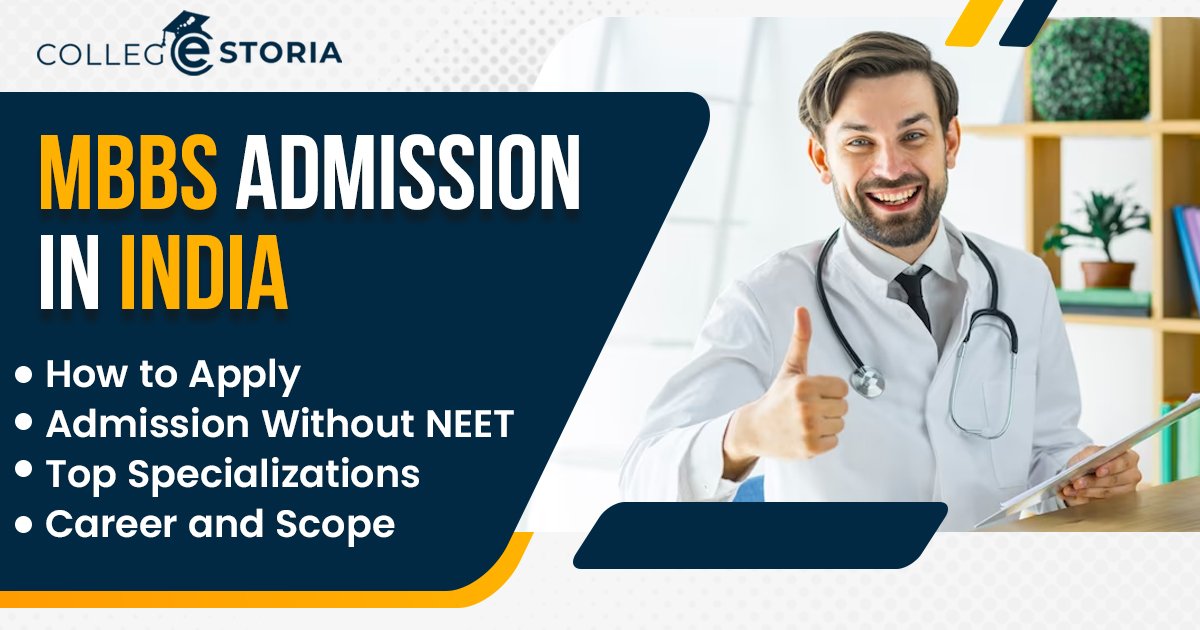MBBS Admission in India: Studying MBBS (Bachelor of Medicine and Bachelor of Surgery) is a popular choice among aspiring medical professionals in India. It is a prestigious degree that equips students with the necessary skills and knowledge to become licensed medical practitioners.
In this guide, we will explore the benefits of studying MBBS, the admission process, eligibility criteria, top specializations, syllabus, career prospects, and further study options after completing MBBS.
Why Study MBBS in India?
MBBS Admission in India offers numerous benefits, making it a preferred choice for many students. Some key advantages include
- Noble Profession: MBBS allows you to make a positive impact on people’s lives by providing medical care and saving lives.
- Global Opportunities: MBBS graduates have ample opportunities to work in various countries and gain exposure to diverse healthcare systems.
- Financial Stability: Medical professionals often enjoy a stable and rewarding career with the potential for high-earning prospects.
- Personal Growth: MBBS education involves rigorous training, which enhances critical thinking, problem-solving skills, and empathy.
- Job Security: The demand for qualified medical professionals remains consistently high, ensuring long-term job security.
You May Also Like: Top MBBS Colleges in India
MBBS Admission in India Eligibility Criteria:
In India, the average length of the MBBS programme is five and a half years, including the one-year required internship. Eligibility criteria for MBBS Admission in India vary across states and institutions but generally include the following:
- The minimum age for admission to MBBS admissio in India is.
- Aspiring candidates must have completed 10+2 or equivalent examinations with Physics, Chemistry, Biology/Biotechnology, and English as compulsory subjects.
- Candidates must have scored a minimum percentage (usually 50% or more) in their 10+2 examination (relaxable for reserved category candidates).
How to Apply for MBBS Admission India:
To apply for MBBS admission in India, follow these general steps:
- Entrance Exams: Most medical colleges in India require candidates to appear for national or state-level entrance exams, such as NEET (National Eligibility cum Entrance Test).
- Register and Apply: Candidates need to register for the respective entrance exams, fill out the application forms, and pay the required fees.
- Admit Card: After successful registration, candidates receive admit cards indicating their exam date, centre, and other essential details.
- Exam and Result: Appear for the entrance exam on the scheduled date. The results will be announced, and qualifying candidates become eligible for counselling and seat allocation.
MBBS Admission in India Without NEET:
Since NEET is the most common entrance exam for MBBS admission in India, it is challenging to secure admission without it. However, some private institutions might have separate entrance tests or consider other merit-based criteria for admission.
Top Specializations:
After completing MBBS, graduates can pursue various specializations, some of which include:
- Paediatrics
- Orthopedics
- Cardiology
- Gynaecology and Obstetrics
- General Surgery
- Dermatology
- Psychiatry
- Ophthalmology
- ENT (Ear, Nose, and Throat)
- Neurology
MBBS in India Syllabus and Subjects:
After MBBS Admission in India, the MBBS syllabus is comprehensive and covers various medical subjects, including:
- Anatomy
- Physiology
- Biochemistry
- Pharmacology
- Pathology
- Microbiology
- Community Medicine
- Medicine
- Surgery
- Obstetrics and Gynaecology
- Paediatrics
- Ophthalmology
- ENT
- Forensic Medicine
- Dermatology
- Psychiatry
You May Also Like: Top MBBS Colleges/Universities in Nepal
Career Aspects & Scope MBBS in India:
After MBBS in India graduates have a wide range of career options, including:
- Setting up private clinics or joining hospitals and healthcare centres as practising doctors.
- Working in government-run healthcare facilities and public health initiatives.
- Engaging in medical research and contributing to advancements in the field.
- Becoming professors or lecturers in medical colleges and universities.
Job Profiles:
Some common job profiles for MBBS graduates include:
- General Practitioner
- Specialist Doctor (based on chosen specialization)
- Medical Officer
- Resident Medical Officer (RMO)
- Medical Researcher
- Medical Consultant
- Medical Officer in Armed Forces
- Hospital Administrator
Higher Study after MBBS:
After completing MBBS, many graduates choose to pursue higher studies and specialized courses like:
- MD/MS: Postgraduate courses to specialize in a specific medical field.
- DM/MCh: Super-specialization courses after MD/MS in fields like Cardiology, Neurology, Oncology, etc.
- Public Health: Pursuing a Master’s in Public Health (MPH) for a career in public health administration and research.
- Healthcare Management: Opting for an MBA in Healthcare Management to enter the healthcare administration and management sector.
In conclusion, if you require personalized assistance and guidance for MBBS admission in India, you can consult with Collegestoria, an educational consultancy that specializes in providing support and information related to medical education. They can help you navigate the admission process and explore the best options for your medical career.
FAQs Related to MBBS Admission in India:
Q1. Are there alternative entrance exams for MBBS Admission in India besides NEET?
Ans. While NEET is the primary entrance exam for MBBS admission, some private institutions may conduct their entrance tests or consider other merit-based criteria.
Q2. Can I pursue MBBS after 12th with subjects other than Biology?
Ans. No, Biology is a compulsory subject for MBBS admission. Students must have studied Physics, Chemistry, Biology, and English in their 12th standard.
Q3. What are the career prospects after completing MBBS?
Ans. MBBS graduates can work as general practitioners, specialists, medical officers, and researchers, or pursue teaching and administrative roles in the healthcare sector.
Q4. What are the top specializations after MBBS?
Ans. Some popular specializations after MBBS include Pediatrics, Orthopedics, Cardiology, Gynecology, Surgery, Dermatology, Psychiatry, and more.
